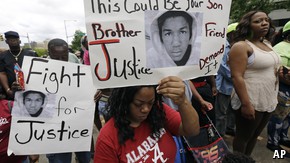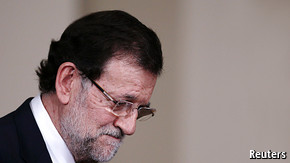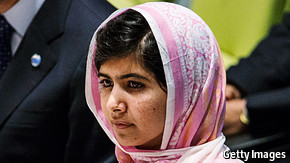Politics this week

The legislature in Texas passed a restrictive anti-abortion bill. Two weeks ago a filibuster by a Democratic state senator seemed to have ended the bill’s chances of succeeding, but Rick Perry, the governor, called a special legislative session to take it up again.
Janet Napolitano decided to step down as secretary for homeland security. She has been in the job since 2009.
The Senate at last approved Richard Cordray’s appointment as head of the new Consumer Financial Protection Bureau. His confirmation had been held up for two years by Republicans, causing Barack Obama to shoehorn him into the job in a recess appointment. The vote came after a deal between the parties that ends filibusters for some of Mr Obama’s nominees.
Done for drugs
Mexican marines arrested Miguel Ángel Treviño Morales, the head of
the Zetas criminal mob. The capture of Mr Treviño, whose gang is
notorious for its brutality, was a victory for Mexico’s new president, Enrique Peña Nieto, who has pledged to cut violence but has downplayed the “drug war” waged by his predecessor. See articlePablo Longueira resigned as the candidate of the ruling centre-right coalition for Chile’s presidential election in November, citing “depression”. He narrowly won a primary last month. Polls suggest that Michelle Bachelet, a former president from the centre-left, will win the election easily.
Leaders of the left-wing Mercosur block said they would withdraw their ambassadors from four European countries in protest at the recent banning of the plane of Evo Morales, Bolivia’s president, because of suspicions that Edward Snowden was on board. Meanwhile, Mr Snowden said he would apply for temporary asylum in Russia; Bolivia, Nicaragua and Venezuela have offered him sanctuary.
Panamanian officials seized a North Korean freighter and found a cache of weapons, including two anti-aircraft missile batteries and two MiG fighter planes. Cuba explained that these were obsolete Soviet-era equipment being sent to North Korea for repair.
Not much joy for Rajoy

Alexei Navalny, a Russian blogger and leading opponent of President Vladimir Putin, was found guilty of embezzlement in a trial and sentenced to five years in jail. He had been hoping to run for mayor of Moscow and insists the trial was politically motivated. See article
Gay marriage was legalised in England and Wales, after gaining royal assent. The act comes into force next year. Scotland is debating its own legislation.
The government in Greece pushed a reform package through parliament that cuts 15,000 civil-service jobs and overhauls the tax system. The measures had been held up, but the European Union and the IMF insisted they should be passed before Greece could have the next €6.8 billion ($8.9 billion) slice of its bail-out. See article
Exclusion zone
An Egyptian interim government was sworn in
following the ousting in a coup on July 3rd of Muhammad Morsi, the
Muslim Brother elected as president a year ago. Hazem el-Beblawi, who
had served as finance minister in the military government after the fall
of Hosni Mubarak two-and-a-half years ago, became prime minister. The
line-up included three women and two Christians but no Islamists. See articleMeeting in Jordan the Arab League backed proposals put forward by John Kerry, America’s secretary of state, to restart the Israeli-Palestinian peace process, especially “the new and important political, economic and security elements”. Mr Kerry is still negotiating with both sides.
Political motives
A war-crimes tribunal in Bangladesh sentenced a
leading Islamist politician to death for crimes committed during the
country’s war of independence in 1971. Ali Ahsan Mohammad Mojaheed,
secretary general of the Jamaat-e-Islami party, was convicted of
genocide, conspiracy to kill intellectuals, torture and abduction. The
verdict came after the party’s spiritual leader, Ghulam Azam, was jailed
for 90 years.At least 22 children died in a village in the Indian state of Bihar after eating a school meal that contained a chemical used in pesticides.
A boat carrying around 150 suspected asylum-seekers capsized off Australia’s Christmas Island. At least four people died.
China detained Xu Zhiyong, a prominent lawyer known for his support of human rights and greater government transparency. He was held on suspicion of “gathering people to disturb order in a public place”.
Zhang Xiaoming, China’s top representative in Hong Kong, had lunch with pro-democracy lawmakers for the first time since the territory reverted to China in 1997. He said that China was sincere about introducing universal suffrage to Hong Kong, but some legislators walked out in protest at the pace of reform.

No comments:
Post a Comment